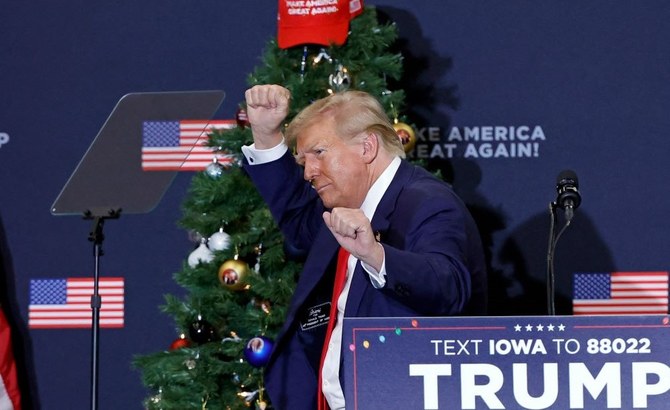Dr. Amal Mudallali
The 2024 American election campaign is shaping up to be a referendum on the future of democracy in the country. The Democrats are making it a referendum on the constitution and on what they describe as the threat of a dictator, in former President Donald Trump, even if it is only for one day, as Trump has promised.
The question on people’s minds is whether America is really heading toward authoritarianism or dictatorship, as politicians and the media are warning. Trump is leading in the Republican primary polls and against President Joe Biden, the Democratic candidate. But the prospect of a second Trump term is driving a panic campaign from his opponents, independents and serious politicians and scholars, who warn that America might be voting for a dictator if it votes for Trump. Former congresswoman Liz Cheney, the vice chairwoman of the panel that investigated the Jan. 6 attack on Congress following the 2020 election, warned this month that the US was “sleepwalking into dictatorship” ahead of the 2024 vote.
The problem for the US is that Trump’s dictator threat or promise – depending on how one feels about him – is not a figment of the country’s imagination. Candidate Trump himself is fueling the anxiety with his rhetoric and statements. Whether he is joking, as his aides claim, or if he is serious is something the Americans might find out to their detriment after the election, should he win.
Concerns about the former president’s authoritarian streak are not new and he has been vocal about going after those who opposed him or are prosecuting him. During a campaign speech in Bedminster, New Jersey, earlier this year he announced that he would “appoint a real special prosecutor to go after the most corrupt president in the history of America, Joe Biden, and the entire Biden crime family.” He doubled down by saying: “I will totally obliterate the deep state. We know who they are. I know exactly who they are.” This sounds like he is threatening revenge.
Trump’s opponents warn that, if he becomes president again, he will be dangerous to the country and the constitution because he will rule with more executive power, use the military domestically, use the judiciary to go after his opponents and critics, including the media, and upend America’s foreign policy. The New York Times wrote in July that Trump and his allies “are planning a sweeping expansion of presidential power over the machinery of government,” including centralizing “more power in the Oval Office and his hands.”
Trump was quoted as saying in South Dakota in September: “If I win and someone wants to run against me, I call my attorney general and say ‘listen, indict him. If he has not done anything wrong, indict him on tax evasion. You’ll figure it out.'” And in an interview with Univision last month, he said: “If I happen to be president and I see somebody who’s doing well and beating me badly, I say ‘go down and indict him.’ They will be out of business; they’ll be out of the election.”
Trump has also threatened on many occasions to use the military to quell protests and violence in American cities or to secure the border, which would violate the Posse Comitatus Act of 1878 that prohibits using the military domestically.
There have also been reports that he plans to invoke the Insurrection Act, which grants the president the authority to use the military in case of an insurrection, upon the request of a state government. The thing that Trump’s opponents fear most is the possibility of him using the president’s sweeping powers to change the US Constitution.
They point to his refusal to accept the result of the 2020 election as a warning sign. They point to a post on his Truth Social account last year, in which he called for “the termination of all rules, regulations, and articles, even those found in the constitution,” and say that the country should not discount this possibility.
Former Immigration and Customs Enforcement chief Thomas Homan told Fox News that, if Trump is reelected, he sees “historic” deportations taking place. After the Hamas attack on Israel on Oct. 7, Trump said he wanted to revoke the student visas of those who, according to him, have anti-American and antisemitic views. He added that he wants to put in place “ideological screenings” for immigrants. On foreign policy, the fear that a future president Trump might withdraw the US from NATO led Congress to act and it last week passed a measure preventing any president from doing so without the approval of the Senate.
Trump says it is Biden who is a threat to the country and not him. The former president points to the multiple indictments he is facing and accuses the White House of weaponizing the Justice Department and the courts and using them against him. The former president’s campaign and supporters discount the allegations against him and dismiss the fears that he will be a dictator as unfounded. Trump’s provocative statements are described by his allies as mere jokes or that they were meant to provoke the left and the media. But the country is not laughing. His comments have created an uproar, with a media and pundit frenzy crying “dictatorship.”
One of his staunchest supporters, Fox News talk show host Sean Hannity, gave Trump a chance to defend himself when he interviewed him at a town hall event in Iowa this month. Hannity asked Trump if he would “abuse power as retribution against anybody.” When reenacting their exchange, Trump said: “We love this guy (Hannity).
He says, ‘you’re not going to be a dictator, are you?’ I said: ‘No, No, No, other than day one. We are closing the border. And we’re drilling, drilling, drilling. After that, I’m not a dictator.'” Many Americans are confident that their country’s constitution, the separation of powers and the strength of US institutions can guard against any president’s authoritarian tendencies and prevent an elected official becoming a dictator or accumulating too much power. However, Cheney does not trust that these institutions can stop Trump. She said on National Public Radio that the stakes “couldn’t be higher” for the country.
Trump may be leading in the polls, but he is also facing a myriad of indictments and legal woes, which are due before the election. He has been indicted in four cases, but a conviction does not mean he cannot still run for president and assume office. The US Constitution does not bar him from doing so, although some experts argue the 14th Amendment, which disqualifies any candidate who has engaged in insurrection, could prevent him holding office again. The Colorado Supreme Court cited the 14th Amendment this week to remove Trump from the state’s Republican primary ballot. His campaign will appeal the ruling and it could go to the Supreme Court, as the battle continues over bringing historic firsts in America. Will he become a dictator, even for one day, and change the country?
Hillary Clinton, the former secretary of state and presidential candidate who ran against him in 2016, said voters should “take him at his word.” It seems that Americans do believe him. A new poll by Harvard CAPS-Harris found that 56 percent of voters surveyed at least somewhat agree that Trump will act like a dictator if he is elected. But 59 percent believe Democrats are unfairly trying to scare voters over Trump by saying he wants to be a dictator, according to The Hill newspaper.
Half of the voters in the poll also believe Trump will be a threat to democracy, but the responses are split along party lines. Trump does not have to be a dictator to be a strong American president. The office of the president has strong executive powers and, if he expands them as is his reported intention, does he actually need to be a dictator?







